QuestionQUESTION: I recently got three young males, all from the same litter. Two days ago I had brought home two because I wanted to make sure they would have plenty of space in the tank I have for them, and today I brought home the third I had wanted.
In the two days I had the first two, I noticed they were very vocal in their tussles! I've had several pet rats over the last six years, and watched some of their dominance struggles and some of their actual fights that were cause to separation, and sound was rarely involved, except in the most violent cases, so that made me quite nervous at first. However, with the two mice it would just be in short bursts while the slightly bigger one chased the slightly smaller one around, and they'd hop a bit, and stop, and then snuggle and eat together and be quite fine.
Today I brought home the third and introduced them all in my smaller carrying cage I have while I cleaned the one they would be living in. (So it would be a neutral ground as far as marked scents went, a habit from when I would introduce my rats together.) They got on quite fine in the neutral zone, but since moving to their proper cage, there seems to be even more chasing than before.
The first two I have seem to have agreed on their balance quite happily, and the larger one is chasing the new one around--likely trying to establish balance with him I'm sure as well. The smaller one and the new one haven't hardly paid each other mind aside from some sniffing. But since the initial dominance scuffles ended, I'm noticing the new ones even more, and extra nervous.
I'm sure they'll calm down in a few days, but I was just curious about what it is supposed to look like? It looks like the larger one is mouthing the new one in his rear areas, and I keep wondering if he's trying to bite his nuts off or something, hah... There isn't any blood or anything, mostly just running and jumping and the larger one mouthing all over the new ones butt and back. And the new one is a little louder vocally, but I can't tell if that's due to the individual or if he's getting it more harshly than the first.
It also isn't constant, they keep randomly going off to play by themselves, and I think if the large one actually meant to threaten him he would be more insistent and not just wander off so aloof. But this is my first time with mice, so I'm not sure how they behave differently than rats.
I think my new one is more adventurous, so he may just not be expecting to be submissive so fast. He keeps climbing on the top of the cage, and runs on the outside of the wheel instead of in it (it's actually really adorable.) So I think they may take longer to work it out than my first pair (as my small one there was clearly more submissive.)
Any advice on regular dominance behavior or warning signs for more dangerous activity would be greatly appreciated! Thank you for your time.
-Kira
ANSWER: Dear Kira,
You've wandered into an unfortunate situation here. You are about to find out something that I found out 1 1/2 years ago when I got my first rats: Rats are not mice.
While male rats can-- and must-- live in pairs or groups, male mice generally have to live alone. They will literally fight to the death. There is only one fairly common exception to this: brothers, or a father-son pair, *if they have never been separated*. You just found this out.
Thus you may or may not end up with two or even three cages for these boys. This is why I strongly discourage casual breeding: One litter may consist of 6 males and 6 females, often resulting in 7 cages. Male mice are very territorial.
That being said, let's see if your guys can be a partial exception to this. First, chasing and loud squeaking is FINE. The squeaking is communication, not evidence of pain. Here are the cases where fighting mice have to be separated:
1. if there is blood.
2. If someone is denied access to food, water, wheel, or nest.
3. if someone becomes depressed, lethargic, unhappy.
4. If the fighting is constant and/or continues for more than a month. (I did have a cage where a new, dominant female was still aggressive fairly often for about 6 weeks, but I watched them carefully and it worked out in the end; this is unusual).
During the chasing and squeaking you may see the less dominant mouse rear up on its hind legs and show its neck and belly to the other. Unlike in rats (or at least what I have read about rats), this is a sign of total submission. This happens most often when the less aggressive one is a baby (I see it as saying "I'm only a baby! Go ahead and kill me! I'm at your mercy!"), but you might see it.
If you feel like the submissive mouse is getting rather a lot of abuse, you can take either mouse out and hold him for a little while to break it up. But obviously don't give them separate cages until you are prepared to keep it that way.
I wish you the very best of luck. Since you obviously love rodents, you might like to meet my "kids" including dwarf rats a little bigger than mice:
https://www.facebook.com/video/video.php?v=10150091824234803
Feel free to friend me on Facebook (Natasha Millikan), although all of my rat and mouse stuff is visible to the public anyway. Just let me know who you are.
squeaks n giggles,
Natasha
---------- FOLLOW-UP ----------
QUESTION: Thanks so very much for the helpful info! I was doing more reading about it last night after sending this and did stumble on a lot of articles saying they (unlike rats) couldn't be housed together, and was quite worried. I did find some that had tips for how to possibly keep them together and what to be on the look out for too. I didn't realize the hind legs was an act of submission, so it's really great you've told me that.
I found the slightly smaller one and the new one got along fairly well, so I've considered if I have to, separating the larger from them. They cuddle and eat together and haven't really chased each other around at all, barring once that seemed far less exciteable. I slept upstairs last night to keep an eye on all of them, and while it seemed like the larger was bullying the new one quite a lot, he eventually let him into the igloo to sleep with my initial pair. (For the first few hours, he was not allowed in.) It's mostly the wheel they are fighting over, now. I will keep an eye on it, and am prepared to separate them if necessary.
At one point I noticed the larger one pushing into the new one like when he would start nipping at him, but then he simply pushed him down, groomed him, and settled down on top of him to fall asleep (which I couldn't help but giggle at.) I didn't think that was such bad behavior, but there continued to be a good deal of chasing and jumping later on that night that didn't always stop at my attempting to disrupt them. There still hasn't been blood, but I would definitely want to keep an eye on them. I'm wondering if I had to leave the house for extended periods of time (to go to work or such), if I should separate them until I get back? Or just hope for the best?
Or would it be safer for me to not attempt to socialize them? I'd feel bad separating them if there is a way to safely keep them together, but I don't want to gamble with their lives if it really is less likely.
I would imagine a fight that would cause bloodshed would be noticeably more violent than the regular way they chase each other around, at least? Or should I just keep checking them to make sure they don't have any scratches?
Loved the video of your rodents! Constantine was very pretty, and your ratties are all so big! I've only had two of mine ever get to that size, by what I'm guessing from the video, haha. They're all beautiful. :)
Thank you again!
AnswerDear Kira,
That was a fast follow-up : ))
I'm glad two of them are getting along. It may work out in the end. What you saw was power grooming! It's another way of showing dominance-- like the mounting, which you have probably seen-- but certainly a more gentle one. Allowing yourself to be power-groomed is a sign of submission. There must be a top (alpha) mouse just like with dogs there is an alpha dog. There doesn't have to be fighting to show this.
I have another suggestion that I thought of after I sent my answer. One thing that can prevent or alleviate fighting is to dab their necks and rumps a couple of times a day with REAL vanilla extract. This makes them all smell the same. You can go this for three days and see if it makes a difference.
If you have to go to work (honestly! The boss doesn't allow mouse days off!) they should be OK for those (say, ten) hours. I can't *absolutely* guarantee this, but, if there is bloodshed it will very likely not be serious yet, in that amount of time. The risk of that not being true is less important than the hopeful possibility that they can be friends. Don't separate them unless it is going to be for good.
One or two tiny scratches is OK, although you should certainly examine them. If you see actual blood they need to be separated. They aren't going to get along after that.
If you have to have separate cages, keep them near each other so the mice can chat. They communicate in a pitch too high for us to hear.
Constantine is still around; the only one of the first video. The second video-- where you get to see the little ones all grown up the size of gerbils-- shows you the new mice. Both Constantine and the new girl Missy are so calm they just sit in your hand. I have watched my breeder create calmer and calmer mice over the last decade. Calmer, means less curious, means, presumably dumber: We now call Constantine and Missy, Catatonia and Lobotoma.
Squeaks n giggles,
Natasha

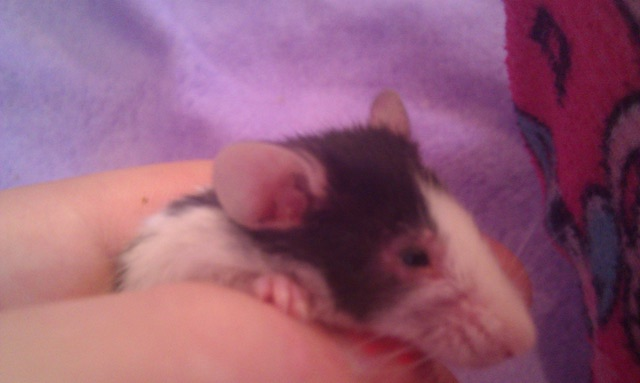 Finding a vet for mouse; painkiller.
Question
raisins face raisins fatness
I go
Finding a vet for mouse; painkiller.
Question
raisins face raisins fatness
I go
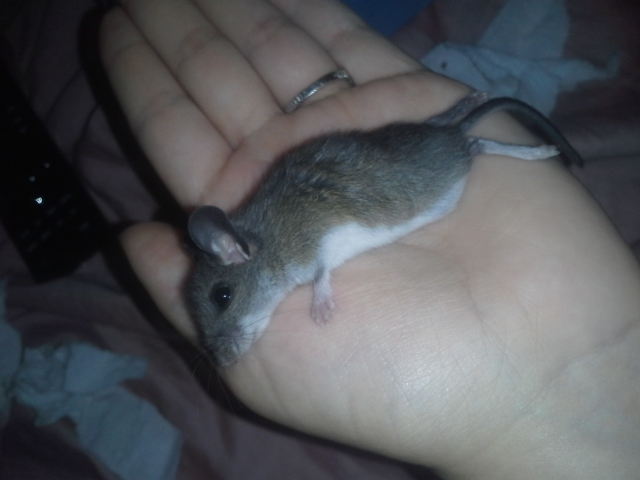 cat brought in injured wild mouse
Question
mouse
Hi,
My name is Alexandria and to
cat brought in injured wild mouse
Question
mouse
Hi,
My name is Alexandria and to
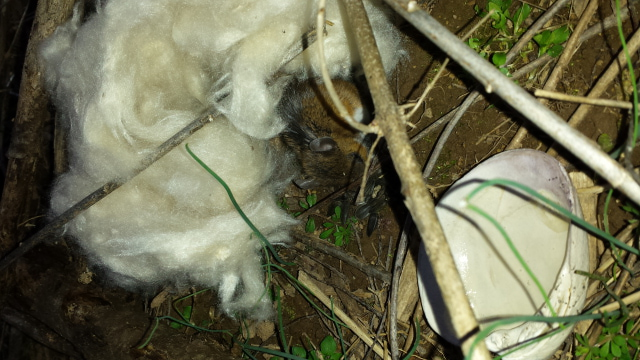 What should I do???
Question
mouse
Hi there!!
I found this field mou
What should I do???
Question
mouse
Hi there!!
I found this field mou
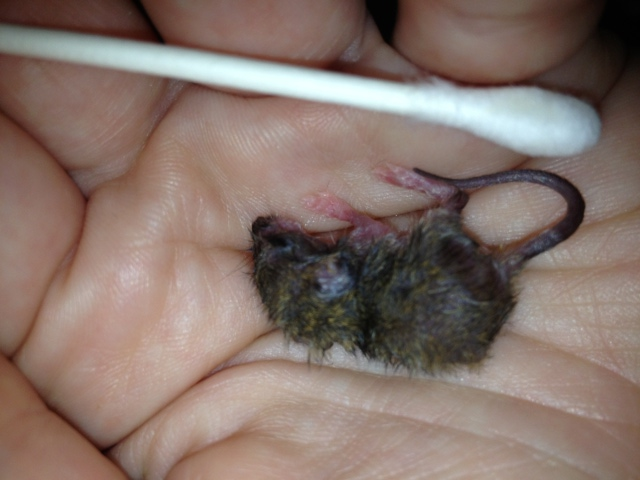 Orphan mouse gaping mouth is fine.
Question
After eating
Hi and thank you for this
Orphan mouse gaping mouth is fine.
Question
After eating
Hi and thank you for this
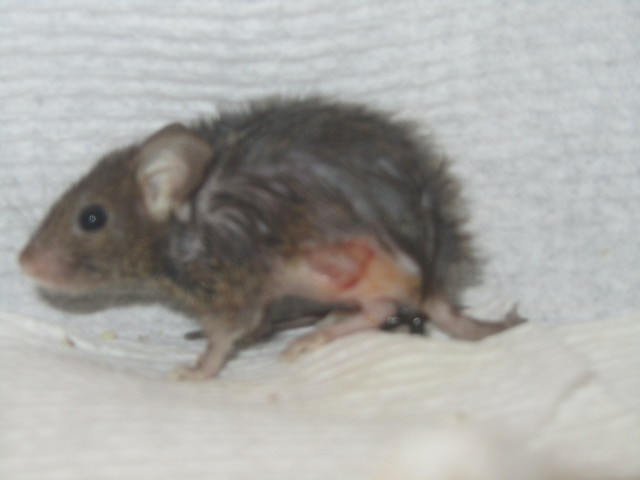 Mouse: caring for wound; washing.
Question
Wounded House Mouse
Natasha,
We found
Mouse: caring for wound; washing.
Question
Wounded House Mouse
Natasha,
We found